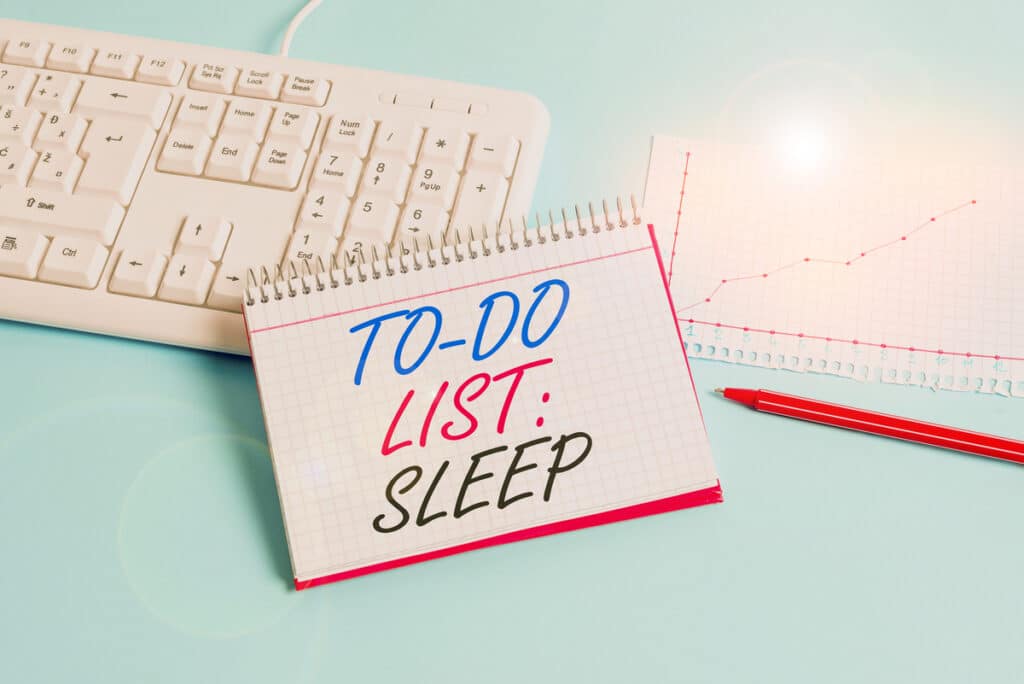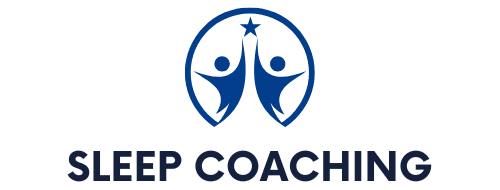Do you find yourself tossing and turning night after night, struggling to get the rest you desperately need? If so, you’re not alone. It’s estimated that 50–70 million Americans experience ongoing sleep disorders and difficulty sleeping., but there’s good news—sleep coaching is emerging as an effective and personalized solution to help you overcome sleep challenges and finally achieve restorative rest.
So, what exactly is sleep coaching? It’s a tailored approach designed to transform your sleep habits for the better. By guiding you through strategies like creating a consistent bedtime routine and understanding the nuances of your sleep cycles, sleep coaching provides practical, actionable steps to help you achieve restful and rejuvenating sleep.

In this guide, you’ll discover everything you need to know about sleep coaching, why it’s essential in today’s fast-paced world, and how it can revolutionize your nights. Say goodbye to restless evenings and hello to the deep, peaceful sleep you’ve been dreaming of!
Understanding Sleep Coaching
Sleep coaching is your key to unlocking better, more restorative sleep. It provides personalized strategies to help you overcome sleepless nights and rediscover the joy of a peaceful bedtime. By focusing on your individual habits, lifestyle, and preferences, sleep coaching uncovers the specific methods that work best for you—helping you finally achieve the quality rest you deserve.
Definition of Sleep Coaching
Sleep coaching is a personalized program designed to help individuals enhance their sleep quality. By working with a professional sleep coach, you’ll receive expert guidance tailored to your unique sleeping patterns, lifestyle, and challenges. Together, you’ll create effective strategies to make falling asleep, staying asleep, and waking up refreshed feel effortless. Think of it as having a dedicated sleep partner who’s there to guide you every step of the way toward better rest.
Who Can Benefit from Sleep Coaching?
Sleep issues don’t discriminate—they can affect anyone. Here are some groups that can especially benefit from sleep coaching:
- Parents of Young Children: Sleepless nights with infants or toddlers can take a toll. Sleep coaching provides strategies to help parents and little ones get the rest they need.
- Busy Professionals: Stress and long work hours often disrupt sleep. A sleep coach can help establish routines that promote relaxation and restorative sleep, even on a hectic schedule.
- Students: Irregular schedules and academic pressure can wreak havoc on sleep. Customized sleep strategies can help students stay well-rested, even during exam season.
- Individuals with Sleep Disorders: Those struggling with insomnia, sleep apnea, or other conditions can benefit from tailored techniques to alleviate symptoms and improve sleep quality.
- Health-Conscious Individuals: People aiming to optimize their overall well-being can use sleep coaching to make quality rest a cornerstone of their healthy lifestyle.
- Aging Adults: Sleep patterns naturally shift with age, but sleep coaching can help older adults adapt and develop habits for deeper, more consistent sleep.
In short, sleep coaching is for anyone seeking better sleep. It’s about uncovering what works for you—because everyone deserves to wake up feeling refreshed and ready to take on the day!
The Science Behind Sleep
Sleep isn’t just downtime—it’s a vital process that influences every aspect of our health and well-being. From physical recovery to mental clarity, sleep plays a critical role in how we function each day. By understanding the profound impact of sleep on our lives, we can better appreciate the value of effective sleep coaching. In this section, we’ll dive into the importance of sleep and examine common disorders that often disrupt it.
Why Sleep Matters
Sleep is essential for both physical and mental well-being. Think of it as the body’s nightly reset—a time when your mind and body recharge, repair, and prepare for the day ahead. During deep sleep, your body repairs tissues, synthesizes proteins, and releases vital hormones. Here’s why sleep is so crucial:
- Physical Health: Quality sleep boosts your immune system and reduces the risk of chronic conditions like heart disease, obesity, and diabetes.
- Mental Clarity: A well-rested brain enhances focus, creativity, and decision-making, making it easier to tackle daily challenges.
- Emotional Balance: Sleep plays a key role in mood regulation. Poor sleep can lead to irritability and anxiety, while proper rest promotes emotional stability.
- Memory Consolidation: Sleep is when the brain processes, organizes, and strengthens the day’s memories, helping you retain and recall information more effectively.
Ever noticed how a good night’s sleep can transform your perspective? That’s no coincidence. Restful sleep fuels motivation, performance, and a brighter outlook on life. It’s not just a luxury—it’s a necessity for thriving in every aspect of your day.
Common Sleep Disorders
Despite its importance, sleep is often disrupted by a range of disorders. Here are some of the most common conditions that interfere with restful nights:

- Insomnia: This condition makes it difficult to fall or stay asleep, often caused by stress, anxiety, or lifestyle habits. Insomnia can leave you feeling exhausted and frustrated, searching for ways to achieve quality rest.
- Sleep Apnea: A serious disorder where breathing repeatedly stops and starts during sleep. Often accompanied by loud snoring and daytime fatigue, sleep apnea requires medical attention to safeguard overall health.
- Restless Legs Syndrome (RLS): This condition involves an uncomfortable urge to move the legs while at rest, often described as a crawling or tingling sensation. RLS can significantly disrupt sleep and make settling down at night a challenge.
- Narcolepsy: A neurological disorder that disrupts the brain’s ability to regulate sleep-wake cycles. Symptoms include excessive daytime sleepiness and sudden, uncontrollable sleep episodes, making daily life unpredictable.
Recognizing these disorders can be the first step toward better sleep. If any of these symptoms sound familiar, it’s time to take action. Sleep coaching offers tailored solutions to address these challenges and help you reclaim the restorative sleep you deserve.
By understanding the science of sleep and the factors that disrupt it, you can truly appreciate the transformative power of sleep coaching. It’s not just about improving rest—it’s about unraveling the secrets of your sleep to create a healthier, more fulfilling life.
What Does a Sleep Coach Do?
Think of sleep coaches as personal trainers for your rest. They do far more than suggest counting sheep—they work closely with you to understand your habits, challenges, and lifestyle. By crafting personalized strategies, they help you achieve better sleep and maintain it. Here’s a closer look at their key responsibilities.
Assessment and Evaluation
The journey to better sleep begins with a comprehensive assessment. A sleep coach starts by analyzing your sleep patterns, habits, and the challenges you face. This process often involves:
- Sleep Journals: Tracking when you sleep, how long you sleep, and how rested you feel upon waking.
- Questionnaires: Exploring your lifestyle, stress levels, and other factors that might impact your sleep quality.
- Sleep Environment Review: Assessing your bedroom for optimal comfort, noise levels, and light exposure.
This in-depth evaluation helps the sleep coach uncover the root causes of your sleep struggles. Think of it as detective work—gathering clues to solve the mystery of your restless nights!
Creating a Sleep Plan
Armed with insights from the assessment, the sleep coach designs a personalized sleep plan tailored to your needs. This plan serves as your roadmap to better rest and typically includes:
- Routine Adjustments: Setting consistent sleep and wake times to align your internal clock and promote regular sleep patterns.
- Relaxation Techniques: Incorporating calming practices, such as meditation or deep breathing, to help you unwind before bed.
- Sleep Hygiene Tips: Optimizing your sleep environment with recommendations on temperature, bedding, lighting, and reducing technology use.
- Behavioral Changes: Addressing habits that may interfere with sleep, such as caffeine intake, late-night snacking, or excessive screen time.

A personalized sleep plan provides clear, actionable steps to help you prioritize and improve your sleep. It’s all about discovering what works best for you and making restful nights a reality.
Techniques Used by Sleep Coaches
Sleep coaches use a range of proven techniques to help you achieve better sleep. These methods are tailored to your specific needs and may include:
- Cognitive Behavioral Therapy for Insomnia (CBT-I): A structured approach that helps reframe negative thoughts about sleep into positive, constructive ones.
- Mindfulness and Meditation: Relaxation practices designed to calm the mind and prepare your body for restful sleep.
- Breathing Exercises: Simple yet effective techniques to reduce anxiety and tension, making it easier to drift off naturally.
- Lifestyle Adjustments: Guidance on diet, exercise, and daily routines that influence sleep quality.
- Sleep Restriction Therapy: A method to regulate sleep patterns by limiting time spent in bed when you’re not sleeping, gradually rebuilding healthy sleep habits.
Each technique is carefully chosen to suit your unique situation. Sleep coaches recognize that everyone’s sleep journey is different, and their adaptable methods are focused on finding the perfect fit to help you achieve lasting sleep success!
Finding a Sleep Coach
Finding the right sleep coach can feel overwhelming with so many options available. How do you choose someone who genuinely understands your unique sleep challenges? In this section, we’ll explore the key qualities to look for in a sleep coach, helping you make an informed decision and ensuring the best fit for your journey to restful, rejuvenating sleep.
Certifications and Qualifications
Selecting a sleep coach with the right credentials is crucial. You want someone with proven expertise, not just a self-proclaimed expert. Here’s what to look for:
- Sleep Coach Certification: Choose a coach certified through accredited programs from reputable organizations. This ensures they have undergone proper training and adhere to professional standards.
- Background in Health Sciences: Coaches with education in fields like psychology, medicine, nursing, or sleep science bring a strong foundation of knowledge to their practice.
- Membership in Professional Associations: Affiliations with organizations such as the American Academy of Sleep Medicine demonstrate a commitment to staying current in the field.
- Experience: Ask about their years of experience and the types of clients they’ve worked with. Practical, real-world experience often leads to better results.
- Client Testimonials: Success stories and positive reviews can provide valuable insight into their effectiveness and client satisfaction.
A skilled sleep coach combines professional knowledge with practical strategies to help you succeed. Checking for these qualifications ensures you’re placing your trust in capable, experienced hands.
Questions to Ask a Sleep Coach
After narrowing down your list of potential sleep coaches, it’s time to interview them to find the best fit. Asking the right questions can help you gauge their approach, expertise, and whether they align with your needs. Below are some key questions for you to consider.

- What is your approach to sleep coaching?
Understanding their methodology ensures it matches your goals and expectations. - How do you personalize sleep plans?
A great coach will tailor strategies to your unique lifestyle, preferences, and challenges. - What are your qualifications?
Don’t hesitate to ask about their training, certifications, and relevant experience—it’s your sleep on the line! - Can you share success stories?
Hearing real examples of past client outcomes can give you confidence in their effectiveness. - What techniques do you use?
Sleep coaches use a variety of strategies; ensure their methods resonate with you and feel manageable. - How do you track progress?
A good coach should monitor your improvement and make adjustments as needed. - What can I expect from our sessions?
Understanding the session format—whether in-person or virtual, along with their duration—can help you feel prepared.
These questions not only help clarify what to expect but also show your commitment to the process. Choosing a sleep coach is an investment in your well-being, so take the time to find someone knowledgeable, supportive, and aligned with your goals. After all, your sleep matters—choose wisely!
Success Stories
Sleep coaching is all about creating real, lasting change—and the proof lies in the inspiring success stories of those who have transformed their sleep. Each individual’s journey highlights the impact of personalized strategies and dedicated support. Let’s delve into these remarkable transformations and hear directly from clients about their experiences and results.
Real-Life Transformations
Meet Sarah, a busy mom managing a demanding job and two toddlers. Years of insomnia left her tossing and turning, her mind racing every night. With guidance from a sleep coach, she developed a calming bedtime routine. Within weeks, Sarah was falling asleep in just 15 minutes and waking up refreshed, ready to tackle her day with newfound energy.
Then there’s Mark, a college student struggling to stay focused during lectures. Late-night study sessions left him perpetually drained. His sleep coach introduced personalized time management and sleep strategies that fit his hectic lifestyle. In just a few weeks, Mark felt more energized, his focus improved, and his grades soared—all while finding time to enjoy his favorite hobbies.
And Lisa, an office worker overwhelmed by stress, found herself staring at the ceiling instead of sleeping. With her coach’s help, she incorporated relaxation techniques into her evening routine. Now, Lisa enjoys restful nights and wakes up recharged, ready to take on her day.
These stories highlight the transformative power of sleep coaching. By addressing individual challenges with tailored solutions, each person proved that restful, restorative sleep is not just a dream—it’s achievable.
Feedback from Clients
What do clients have to say about their experiences with sleep coaching? The reviews are overwhelmingly positive, showcasing the transformative impact of personalized guidance. Here’s a summary of their insights:
- Transformational Experience: Many clients describe sleep coaching as a life-changing journey, saying they feel like entirely new people after improving their sleep.
- Increased Productivity: Better sleep leads to sharper focus and heightened energy. Clients frequently report improved productivity at work or school, allowing them to excel in their daily tasks.
- Enhanced Mood: A common theme is the boost in emotional well-being. Clients often express gratitude for waking up happier, more motivated, and ready to take on the day.
- Customized Support: Clients appreciate the personalized approach, valuing the tailored strategies that seamlessly fit into their unique lifestyles.
- Lifelong Skills: Many highlight the long-term benefits of sleep coaching, noting they’ve learned practical habits they can maintain independently for lasting results.
These testimonials underscore the effectiveness of sleep coaching in helping individuals reclaim their sleep and elevate their overall quality of life. It’s clear that with the right guidance, restful nights and energized days are within reach.
Tips for Improving Sleep Without Coaching
Improving your sleep doesn’t have to feel overwhelming. By making small, intentional changes, you can achieve significant results. Let’s explore some practical habits and helpful tech tools that can boost your sleep quality and transform your nights.
Sleep Hygiene Practices
Establishing healthy sleep hygiene practices can dramatically enhance the quality of your rest. Here are some effective habits to incorporate into your routine.

- Stick to a Consistent Schedule: Go to bed and wake up at the same time every day, including weekends. A regular sleep schedule helps regulate your internal clock.
- Create a Relaxing Pre-Bed Routine: Engage in calming activities like reading, meditating, or taking a warm bath to signal to your body that it’s time to wind down.
- Optimize Your Sleep Environment: Make your bedroom a sanctuary for sleep. Keep it dark, quiet, and cool with blackout curtains and white noise machines if necessary.
- Limit Screen Time: Reduce exposure to screens at least an hour before bed. The blue light from devices like phones and computers can suppress melatonin production, disrupting your sleep.
- Be Mindful of Food and Drink: Avoid heavy meals, caffeine, and alcohol close to bedtime, as they can interfere with your ability to fall and stay asleep.
- Incorporate Regular Exercise: Aim for at least 30 minutes of physical activity most days. However, steer clear of intense workouts in the hours leading up to bedtime.
- Nap Wisely: Keep naps short and avoid napping late in the day, as it can interfere with nighttime sleep.
By embracing these habits, you’ll create a sleep-friendly lifestyle that promotes better rest and overall well-being. Think of it as a daily investment in your health and energy.
Tech Tools for Better Sleep
In today’s tech-savvy world, innovative apps and devices can help you monitor and enhance your sleep. Here are some worth exploring:
- Sleep Apps: Apps like Sleep Cycle and Calm track your sleep patterns and provide guided relaxation techniques to help you wind down and improve your rest.
- Fitness Trackers: Devices like Fitbit or Apple Watch do more than monitor your activity—they also analyze sleep stages and quality, offering insights to fine-tune your sleep routine.
- White Noise Machines: These devices create a soothing soundscape, masking disruptive noises and fostering a peaceful sleep environment.
- Smart Mattresses and Pillows: High-tech options with built-in sensors analyze your sleep and adjust comfort levels automatically to support optimal rest.
- Meditation Apps: Programs like Headspace and Insight Timer feature bedtime meditations designed to relax your mind and prepare you for sleep.
Incorporating these tech tools into your nightly routine can make improving your sleep more engaging and effective. It’s all about discovering what works best for you!
With these tips and tools in your arsenal, you’re well-equipped to make meaningful changes to your sleep habits. Better rest—and brighter days—are just a few tweaks away!
Conclusion
Sleep coaching provides a personalized path to achieving restful nights and better overall health. By evaluating your sleep habits, designing tailored strategies, and applying proven techniques, sleep coaches empower you to overcome sleep challenges and reclaim your well-being.
As we’ve explored, sleep is essential for both physical and mental health. It improves mood, enhances productivity, and supports overall vitality. If you’re still struggling with restless nights, partnering with a sleep coach could be the key to unlocking peaceful, rejuvenating sleep.
Remember, sleep isn’t a luxury—it’s a necessity. Embrace the opportunity to transform your nights and take the first step toward a more rested, energized you. What steps will you take today for better sleep? Share your thoughts or success stories in the comments—we’d love to hear from you!
Stone Evans, Founder of SleepCoaching.com
Stone Evans is the founder of SleepCoaching.com which has become one of the most popular destinations online for people seeking better sleep. Stone started developing this website after realizing his own sleep struggles and then beginning an intensive period of study (which included professional sleep coach training) and ongoing lifestyle changes to improve and optimize his sleep.
Now through in-depth articles from sleep experts around the world, the internet's leading and most comprehensive sleep coaching directory, quantitative sleep product reviews and Stone's personal daily sleep tracking journey, visitors to our website regularly report gaining information and insights that are helping them achieve better health, better sleep and a better quality of life.


This is such an informative guide on sleep coaching! It’s really eye-opening to see how tailored strategies can make a huge difference in achieving restful sleep.
Personally, I think sleep coaching is a game-changer for anyone struggling with consistent sleep issues. It’s not just about getting more sleep, but about improving the quality of sleep, which is crucial for overall health and well-being.
With the right guidance, I believe most people could see noticeable improvements in just a few weeks. That said, since every individual’s sleep patterns and challenges are different, it may take some time to fully optimize the routines and habits that work best for them. Overall, though, it seems like a powerful tool for those seeking better, more rejuvenating sleep!
Wow, what an eye opening article, learn something new all the time, who knew there were sleep coaches.
In your article you made it clear what a sleep coach is and how they can help you. As someone who has sleep apnea, this is enlightening. I try and get all the rest I need, but it’s hard for me to sleep for 8 hrs., is that a problem and will it cause harm to me over a long period?
It seems my body is on a clock and I wake up the same time every morning, which is early. But after reading your article I can see a few subtle changes I could make to get more sleep. Thanks for a great read.
Thank you for this comprehensive and eye-opening guide on sleep coaching.
I found the breakdown of what a sleep coach does, along with the personalized strategies they provide, incredibly insightful.
The real-life success stories you shared really help illustrate the transformative impact sleep coaching can have on someone’s well-being—it’s inspiring to see how small, intentional changes can lead to such profound results.
A few questions come to mind after reading this:
How does someone decide if they need a sleep coach versus seeking help from a medical professional for sleep disorders like sleep apnea or insomnia? It seems like there’s some overlap, so understanding when to choose one path over the other could be helpful.
Are there particular lifestyle changes or habits that a sleep coach sees most often as “quick wins” for improving sleep quality? For example, is adjusting screen time or caffeine intake generally more impactful than optimizing the bedroom environment?
What role does accountability play in sleep coaching? Do clients often find it easier to stick to their sleep plans because they have someone guiding and checking in on their progress?
Have you seen any notable trends in sleep coaching, such as more people turning to virtual or app-based coaching rather than in-person sessions? It would be fascinating to hear how technology is evolving this field.
Lastly, are there any red flags to watch for when choosing a sleep coach? For example, what would distinguish a highly qualified sleep coach from someone who might lack the right training or expertise?
This article really highlights how critical sleep is to our overall well-being, and it’s refreshing to see such a practical approach to tackling sleep issues. I’m curious to hear what others think—especially if they’ve tried sleep coaching or adopted sleep hygiene practices that worked well for them!
Thank you for sharing this thoughtful and detailed guide.
I look forward to hearing more about this topic and continuing the discussion.
Wow, I had no idea sleep coaching was even a thing! It’s fascinating to learn that there are professionals who can help with this. I’m curious, what made you get into sleep coaching? And how does it differ from just going to a regular doctor for sleep issues?
I’m particularly intrigued by the part where you mentioned it’s like having a “dedicated sleep partner” to guide you. Do sleep coaches work with you long-term, or is it more of a short-term solution until you develop better habits?
Would love to hear more about your experience in this field!
Eric
This is a fascinating guide on sleep coaching! It’s interesting to see how sleep coaching provides personalized solutions, especially when compared to traditional methods like sleep studies or therapy. I believe both approaches have their place, but sleep coaching’s tailored strategies seem particularly useful for those who need ongoing support in adjusting their habits.
From my own experience, establishing a consistent bedtime routine has been a challenge, especially with an unpredictable work schedule. However, the idea of a sleep coach helping to address lifestyle factors and creating a plan to fit individual needs resonates deeply. It’s clear that sleep coaching is not just about improving rest, but about enhancing overall well-being in a sustainable way.
This topic is incredibly relevant today, as many people face sleep disruptions due to busy lives. I think the personalized approach of sleep coaching can offer a real solution for those seeking more restful, rejuvenating nights.